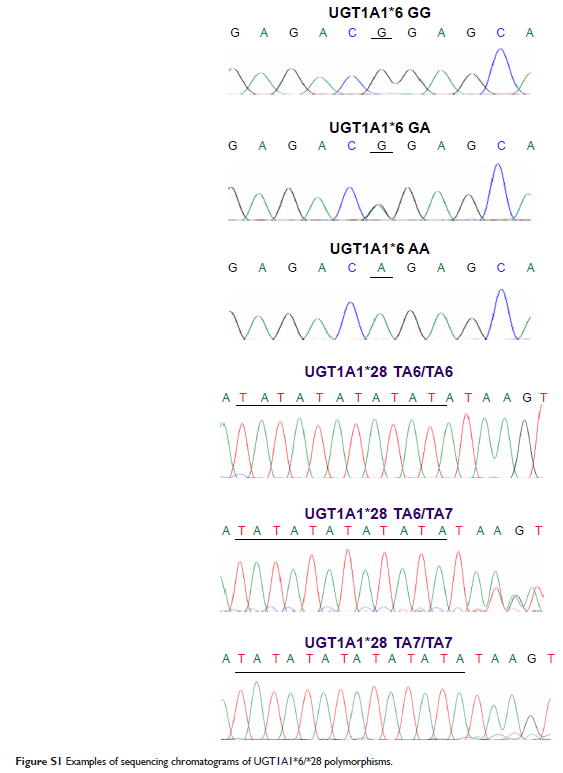109669
论文已发表
注册即可获取德孚的最新动态
IF 收录期刊
- 3.4 Breast Cancer (Dove Med Press)
- 3.2 Clin Epidemiol
- 2.6 Cancer Manag Res
- 2.9 Infect Drug Resist
- 3.7 Clin Interv Aging
- 5.1 Drug Des Dev Ther
- 3.1 Int J Chronic Obstr
- 6.6 Int J Nanomed
- 2.6 Int J Women's Health
- 2.9 Neuropsych Dis Treat
- 2.8 OncoTargets Ther
- 2.0 Patient Prefer Adher
- 2.2 Ther Clin Risk Manag
- 2.5 J Pain Res
- 3.0 Diabet Metab Synd Ob
- 3.2 Psychol Res Behav Ma
- 3.4 Nat Sci Sleep
- 1.8 Pharmgenomics Pers Med
- 2.0 Risk Manag Healthc Policy
- 4.1 J Inflamm Res
- 2.0 Int J Gen Med
- 3.4 J Hepatocell Carcinoma
- 3.0 J Asthma Allergy
- 2.2 Clin Cosmet Investig Dermatol
- 2.4 J Multidiscip Healthc

已发表论文
UGT1A1*6/*28 基因多态性与接受含伊立替康 (irinotecan) 方案治疗的中国胰腺或胆道癌患者的严重毒性之间的关系
Authors Yang C, Liu Y, Xi WQ, Zhou CF, Jiang JL, Ma T, Ye ZB, Zhang J, Zhu ZG
Published Date July 2015 Volume 2015:9 Pages 3677—3683
DOI http://dx.doi.org/10.2147/DDDT.S86750
Received 16 April 2015, Accepted 15 June 2015, Published 17 July 2015
Purpose: The aim of this retrospective study was to investigate the relationship
between UGT1A1 polymorphisms and toxicities in Chinese patients with pancreatic
or biliary tract cancer receiving irinotecan-containing regimens as the second-
or third-line chemotherapy.
Patients and methods: A total of 36 patients with unresectable pancreatic cancer and 12 patients with unresectable biliary tract cancer were included. Approximately 33 patients were treated with FOLFIRI regimen, a chemotherapy regimen, where FOL stands for folinic acid, F for fluorouracil, and IRI for irinotecan (irinotecan 180 mg/m2 at day 1, CF 200 mg/m2 at day 1–2, 5-FU 400 mg/m2 at day 1–2, followed by continuous infusion of 5-FU 600 mg/m2 for 22 hours at day 1–2, every 2 weeks). The other 15 patients were treated with irinotecan monotherapy (180 mg/m2, every 2 weeks). UGT1A1*6/*28 polymorphisms were detected by direct sequencing.
Results: The frequencies of GG, GA, AA genotypes for UGT1A1*6 were 70.8% (n=34), 25.0% (n=12), and 4.2% (n=2), respectively. And those of TA6/TA6, TA6/TA7, TA7/TA7 for UGT1A1*28 were 79.2% (n=38), 18.8% (n=9), and 2.0% (n=1), respectively. A total of 22 patients (45.8%) had grade III–IV neutropenia, and six patients (12.5%) experienced grade III–IV diarrhea. The incidence of grade III–IV neutropenia in patients with UGT1A1*6 GA or AA genotype was 71.4%, which was significantly higher than that with GG genotype (35.3%, P =0.022). No relationship was found between grade III–IV neutropenia and UGT1A1*28 polymorphism. The statistical analysis between grade III–IV diarrhea and UGT1A1*6/*28 polymorphisms was not conducted in view of the limited number of patients.
Conclusion: In Chinese patients with pancreatic or biliary tract cancer administered irinotecan-containing regimens, those with UGT1A1*6 variant may have a high risk of severe neutropenia.
Keywords: UGT1A1 polymorphism, irinotecan, pancreatic cancer, biliary tract cancer, neutropenia, diarrhea
Patients and methods: A total of 36 patients with unresectable pancreatic cancer and 12 patients with unresectable biliary tract cancer were included. Approximately 33 patients were treated with FOLFIRI regimen, a chemotherapy regimen, where FOL stands for folinic acid, F for fluorouracil, and IRI for irinotecan (irinotecan 180 mg/m2 at day 1, CF 200 mg/m2 at day 1–2, 5-FU 400 mg/m2 at day 1–2, followed by continuous infusion of 5-FU 600 mg/m2 for 22 hours at day 1–2, every 2 weeks). The other 15 patients were treated with irinotecan monotherapy (180 mg/m2, every 2 weeks). UGT1A1*6/*28 polymorphisms were detected by direct sequencing.
Results: The frequencies of GG, GA, AA genotypes for UGT1A1*6 were 70.8% (n=34), 25.0% (n=12), and 4.2% (n=2), respectively. And those of TA6/TA6, TA6/TA7, TA7/TA7 for UGT1A1*28 were 79.2% (n=38), 18.8% (n=9), and 2.0% (n=1), respectively. A total of 22 patients (45.8%) had grade III–IV neutropenia, and six patients (12.5%) experienced grade III–IV diarrhea. The incidence of grade III–IV neutropenia in patients with UGT1A1*6 GA or AA genotype was 71.4%, which was significantly higher than that with GG genotype (35.3%, P =0.022). No relationship was found between grade III–IV neutropenia and UGT1A1*28 polymorphism. The statistical analysis between grade III–IV diarrhea and UGT1A1*6/*28 polymorphisms was not conducted in view of the limited number of patients.
Conclusion: In Chinese patients with pancreatic or biliary tract cancer administered irinotecan-containing regimens, those with UGT1A1*6 variant may have a high risk of severe neutropenia.
Keywords: UGT1A1 polymorphism, irinotecan, pancreatic cancer, biliary tract cancer, neutropenia, diarrhea
